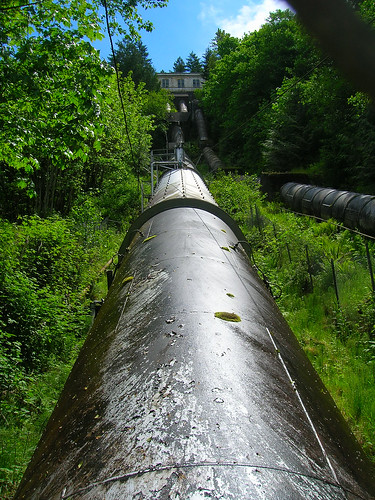Water is Cheap… For Now
Yesterday, I showed up to a water conference to supplement my knowledge of energy issues, mind you as the only non-engineer for whom the molecule drawings instead look more like adorable Mickey Mouse figurines. Clearly, I am addicted to the high of being somewhere where I don’t belong. I suppose it’s a history with me, my old’ 'œI’m the only lawyer in Ibiza' syndrome acting up, an extension of my 'œI would like to skip the second grade,' a request that was granted for me.
But, as usual, I digress. So here is the deal. Water is a cheap-ass resource. In fact most of us are charged just for the price of delivery of water to our homes, rather than the actual value of water. And with aging infrastructure all over the country (most of New York’s water system, at least, was built pre-1936), increased populations/use of water where water is scarce, higher water quality regulations, and high energy use to treat water, we are in for either a collapse, lower quality water (illegal), soaring rates, or water wars. In the water world, Mark Twain is often quoted for his line: 'œWhiskey is for drinking and water is for fighting.' Forget just some far away region in Africa, we are already seeing that in the U.S. Presently, Georgia and Alabama are fighting over access to water due to an unusually high drought season.
To manage these problems, the whole sector has to change. Looking at the image above, you see that we aren’t dealing with tiny things here, these pipes are huge, plants for treating water are complex, and it all needs to be updated to meet our evolving needs. So far, water providers try to stay invisible as a utility rather than a service provider, and the only time you hear about them is if something goes wrong, so, in other words, when you don’t want to. But the water industry has increased life by 20 years, the medical profession by only 10. Do we understand how valuable our clean water is? No, and they admit that’s their fault. Now the profession has to get flashy and teach people (strong marketing = teaching) about the true value of water, so that the customer can change, not just in its efforts to conserve, but in accepting that water is not a given and to cough up money for capital improvements. Thus, there needs to be a paradigm shift on the consumer and provider side.
Other fun facts I learned:
'¢ Pharmaceuticals and other bioproducts that we ingest come out in our excretion and when it gets into the water stream, the left over compounds of the drugs have been known to change the sex of certain fish. Gotta love Advil.
'¢ Urine has a bunch of chemicals that need to be removed. By separating urine at the source through urine separation technologies we could save about 25% of energy used at wastewater treatment plants.
'¢ In some instances water conservation is bad. For e.g., low toilet water levels means transporting gases with less dilution, which means high level coercion in the collection systems.
Well, that’s it. If you want to know more, YOU sit through it a nine-hour conference about it, or check out some materials here.










